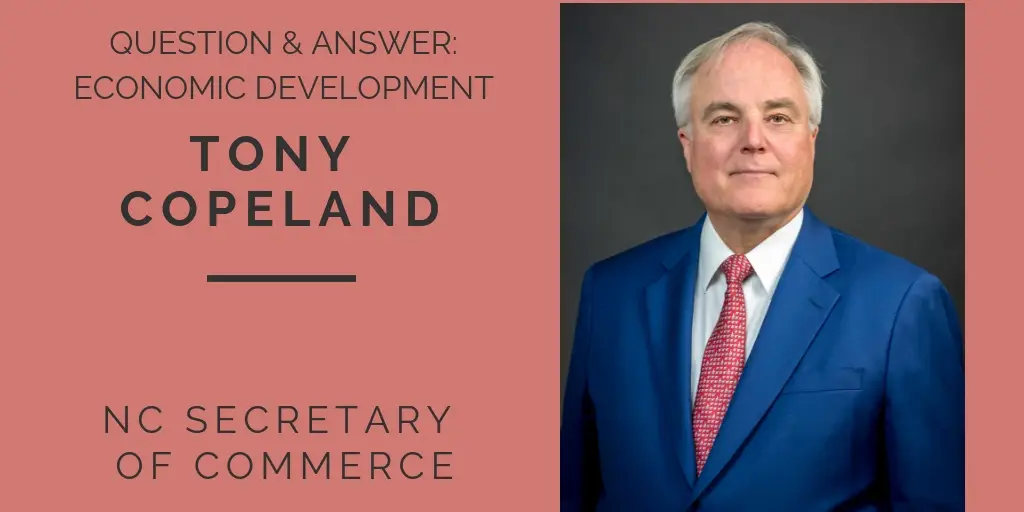Golden LEAF works in partnership with other entities across the state to bolster economic development, especially in rural, tobacco-dependent and economically distressed areas. One of the Foundation’s partners is the North Carolina Department of Commerce. North Carolina Secretary of Commerce Tony Copeland addressed the department and economic development in North Carolina.
What is your organization’s role in economic development?
The Department of Commerce is the state’s lead agency for workforce, community, and economic development. We coordinate what I like to call the state’s ‘wrap-around’ strategy. Companies search for a variety of things when they consider a location, more than any single organization could deliver. To succeed, it takes many organizations working together to wrap around a company at the local, regional, and state levels to deliver the solutions companies look for in a business location.
What organizations do you consider to be key economic development partners?
Each company we work with has different needs and requirements, so saying which partner plays the key role can change considerably, depending on the situation. Our education partners at the state’s universities and community colleges are always part of the conversation, and a partner like Golden LEAF also plays a key role, because it is at the forefront of helping local leaders prepare their communities for economic development, from putting in infrastructure to workforce training.
What are some of the major success stories involving Golden LEAF support you have seen in rural economic development since serving in your role?
Our partnership on the first round of recovery grants for Hurricane Matthew comes to mind. These grants helped many people get back on their feet and back into business. We’ve also worked closely on important site development grant projects, like the Major Site Development Initiative. Golden LEAF is such a strong partner for our department it’s difficult to choose, because we work on so many projects together.
What advantages does North Carolina have to offer over others in the area of economic growth?
North Carolina offers an attractive package that includes world-class transportation infrastructure, education and training systems, and local and state leaders that understand the needs of business. Combined with a competitive business climate, skilled workforce and a central, east coast location that allows companies to ship goods quickly to their North American customers, North Carolina remains an excellent choice for companies seeking to grow.
What tools does your organization have to help create economic growth?
We’re probably best known for financial incentive programs like the One North Carolina or Job Development Investment Grants (JDIGs). But economic development success depends first and foremost on adequate preparation. Communities need industrial grade water and sewer lines, shovel-ready sites and buildings ready to occupy. Commerce offers a host of grant programs to help communities with this work.
What are your goals in creating the best atmosphere for economic development?
Governor Cooper talks often about his mission to help North Carolinians be better educated, healthier and have more money in their pockets so that they can live more abundant, purposeful lives. I’m pleased our work in economic development is helping bring this vision to life.
How is North Carolina working to be more competitive now and in the future for economic growth?
Staying competitive involves many factors in today’s global economy, but none is more important than our focus on the state’s education and workforce development programs. Governor Cooper’s NC Job Ready initiative is helping people attain the skills they need for the jobs of the future. We’re also making sure business leaders are at the table to guide our workforce efforts.
What are your thoughts on post-secondary education as an economic driver?
In today’s world, a commitment to life-long learning is no longer a luxury, it’s a necessity. Jobs and technologies are changing quickly, and depend more than ever on knowledge and specialized skills. Strong post-secondary education programs have always been important, but today are more important than ever.
How important is entrepreneurship to our state?
Entrepreneurship plays an important role in keeping our economy vibrant and innovative. Commerce offers a matching grant program for emerging technology companies through our Office of Science, Technology & Innovation. Many of the companies we supported during their early stages are now thriving, adding jobs, and bringing new technologies to the market.
What are our biggest growth industries today?
We’re seeing strong growth in information technology and biotechnology companies, and advanced manufacturing firms are also being attracted here.
In what sectors would you like to see industry growth?
We invite all industry sectors to locate and grow in our state, but there’s no question we must continue to focus on the knowledge-based industries of the future. Those can take many forms, but include areas like automation, predictive analytics, clean energy, gene therapies, and a host of industries applying advanced manufacturing techniques.
About NC Commerce Secretary Tony Copeland
Tony Copeland became North Carolina’s Secretary of Commerce in January 2017, named to the post by Governor Roy Cooper and marking a return to the agency for the experienced business executive.
Earlier in his career, Copeland served as an Assistant Commerce Secretary, leading the recruitment of nearly $12 billion in investment and the creation of nearly 100,000 jobs. In this capacity, he worked with numerous international companies in China, Japan, Europe, South Korea and Israel, as well as a variety of domestic companies.
Copeland’s experience spans a wide range of economic development and business leadership roles. During the past decade, as part of a major law firm, Copeland has brought significant new corporate investment into North Carolina from both domestic and international sources. He brings an insider’s knowledge of the ways corporate investment and site decisions are made.
A native of Hertford in the northeastern part of the state, Copeland is a graduate of Duke University and the Western Michigan University School of Law.

